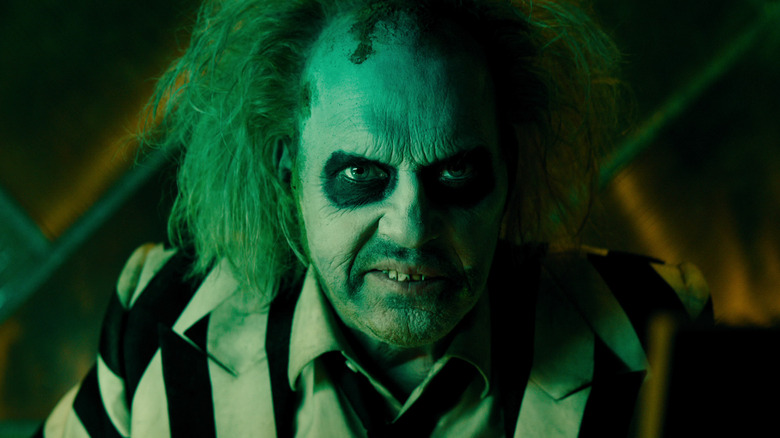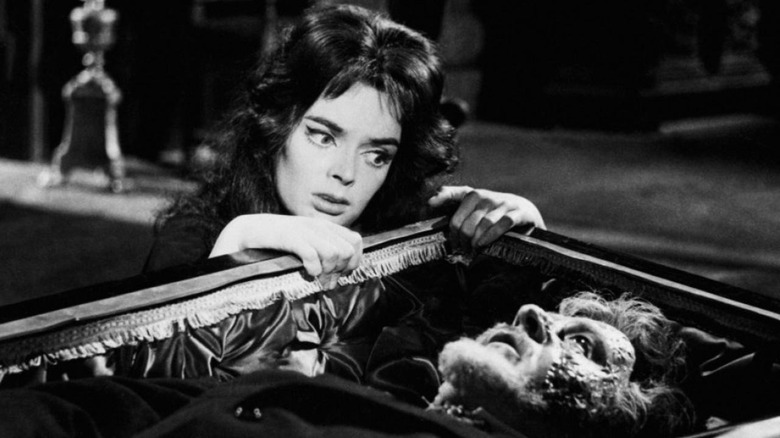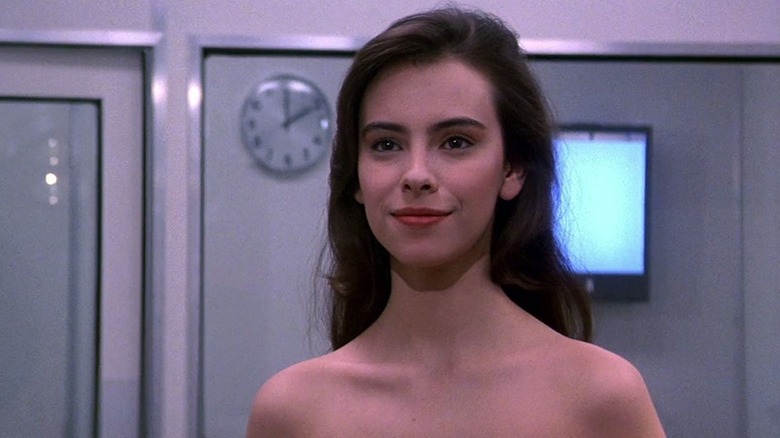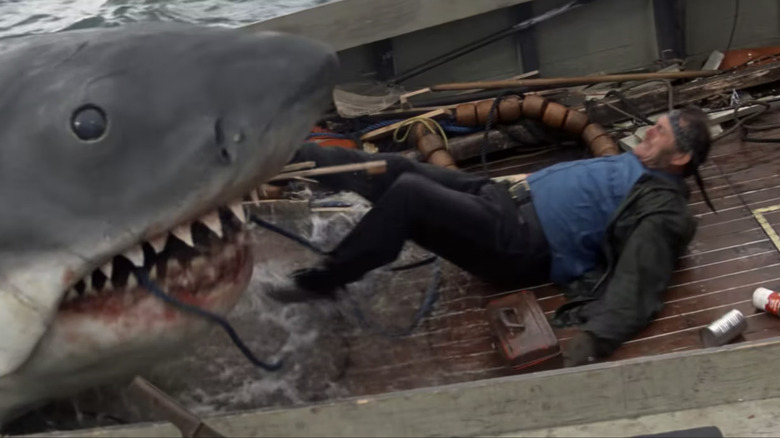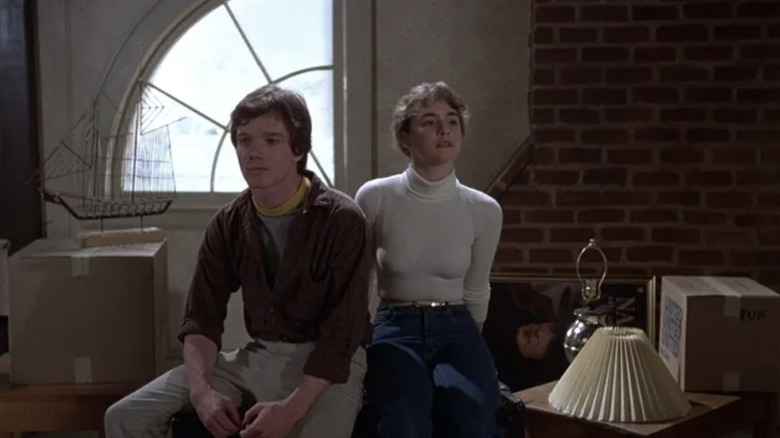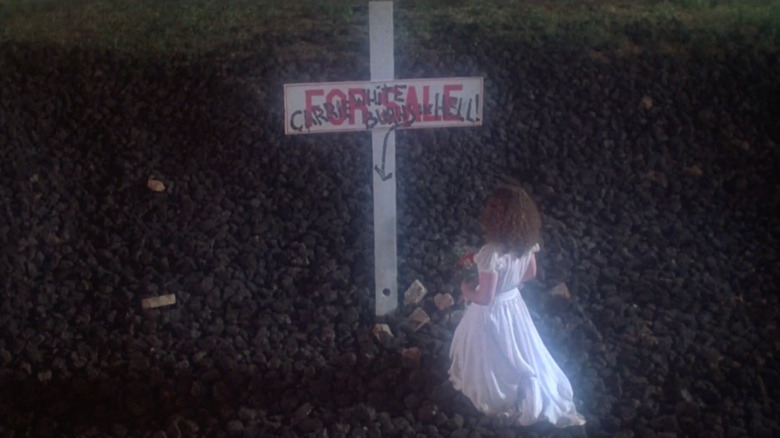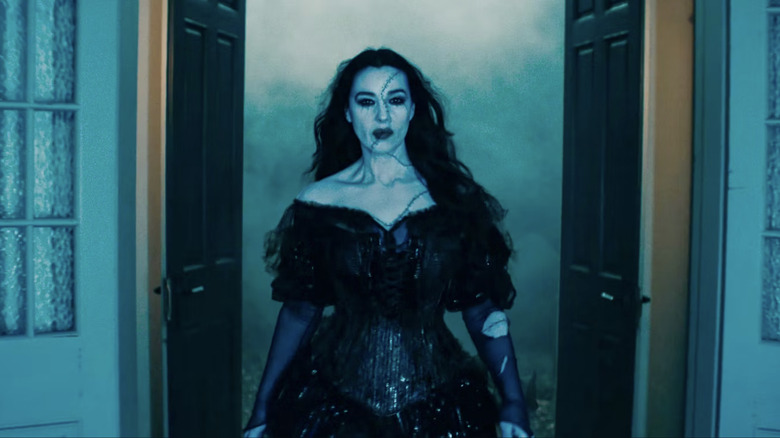Every Horror Movie Easter Egg Hidden In Beetlejuice Beetlejuice
This article contains massive spoilers for "Beetlejuice Beetlejuice." Don't say it a third time!
If there ever was a filmmaker who wasn't afraid to let his freak flag fly, it's Tim Burton. Years before the likes of Clive Barker, Guillermo del Toro, Edgar Wright, and other horror geeks began making films, Burton was infusing all of his short films and subsequent feature films with homages to all manner of horror film ephemera. Even though Burton has expanded and experimented with his personal aesthetic over the course of his career, he's never lost his horror nerd credentials. His latest film, "Beetlejuice Beetlejuice," is further proof of this, as it's saturated with all manner of esoteric elements, and not just ones involving horror films, either: Burton is also a big fan of alternative music and nostalgic kitsch.
Although "Beetlejuice Beetlejuice" doesn't have to try too hard at being horror — the genre is baked right into the "ghosts and undead" premise — Burton seems to work overtime to give the film its horror cred, even more than the original 1988 "Beetlejuice." What follows is a list (and not necessarily a complete one, but one that aims to be!) of all the horror easter eggs in the film, some of which you may have caught, and some that you may want to dig a dank, dark hole further into.
Beetlejuice's Black Sunday
The most blatant easter egg in "Beetlejuice Beetlejuice" — let's be real, it's a full-blown homage — arrives when Beetlejuice (Michael Keaton) tells his Shrinker coworkers the backstory behind his marriage to his ex-wife, Delores (Monica Bellucci). In terms of the story itself, it's generically Gothic; Beetlejuice, as a living man, was a grave robber during the Black Plague. He meets Delores and is enraptured by her, they marry, have a passionate night together, and she poisons him due to her being part of a soul-sucking death cult, but not before he hacks her to bits with an axe.
Yet this flashback is told in a very particular style, all in black & white, and with Beetlejuice suddenly speaking Italian (with English subtitles for us to follow along). This entire sequence is a homage to the films of Italian filmmaker Mario Bava, a man who ushered in the Gothic horror trend in Italy as well as helped create the giallo subgenre. The sequence seems to specifically reference his "Black Sunday" (aka "La Maschera del demonio," 1960), with Bellucci being styled in a fashion reminiscent of Barbara Steele in Bava's movie. The scene isn't the only Bava shoutout in "Beetlejuice Beetlejuice," however; the filmmaker gets name-checked verbally by Lydia Deetz (Winona Ryder), who explains to her daughter Astrid (Jenna Ortega) that her father and Lydia were at an all-night Bava-thon when Lydia went into labor with her, and that "Kill, Baby, Kill" (aka "Operaziona paura," 1966) was her father's favorite Bava movie.
Delores hunts for Beetlejuice's Lifeforce
"Beetlejuice Beetlejuice" was happily very successful at the box office on its first weekend of release, and it's generally very heartening to see audiences flock to a big, spooky, kooky, studio horror comedy. However, with success comes Discourse, a fate that seems inescapable for any hit film these days, in which some weirdos start nitpicking the strangest elements as they grasp for loose threads with which to unravel the movie. You would think that the presence of the ethereally beautiful Monica Bellucci as an undead menace stalking the halls of the Afterlife for the titular character would be self-explanatory in its appeal, yet some Discourse out there is claiming that her entire character is "unnecessary."
Setting aside the odious implication of the word (part of a disease in which some people approach art as if they're worshipping at the altar of CinemaSins or number-crunching studio executives), the criticism is easily dispelled on two levels. For one, there's the purely aesthetic pleasure of the character and the added layer of menace she brings to the story: Because Beetlejuice is both villain (menacing Lydia with forcing her into marriage) and antihero (helping save Astrid from a murderer), then Delores can be seen as the film's true wild card, a character who is both potential threat and savior. If that explanation isn't enough justification for those of you crying "unnecessary," how about this: Delores' M.O. in the film, coming upon unsuspecting Afterlife denizens and sucking the souls from their bodies, not only provides the "death for the dead" threat that exorcism did in the first "Beetlejuice," it also homages Tobe Hooper's "Lifeforce," in which a beautiful space vampire (played by Mathilda May) starts sucking the lifeforce from everyone she meets in London. Who wouldn't want such a character in their film, I say!
Charles Deetz's nightmare before shark attack
"Beetlejuice Beetlejuice" has a lot of mean-spirited fun with the fate of Charles Deetz (look up who played him in the 1988 original, and you'll see why). Not only does the unfortunate man suffer a plane crash before being chomped on by a shark, but he's made to wander the Afterlife as just a walking torso and legs. The tale of his fateful crash into the ocean is depicted completely with stop-motion animation, which is a particular favorite medium of Burton's. Not only is there other stop-motion used in "Beetlejuice Beetlejuice" (particularly with the sandworms), but Burton produced one stop-motion feature, 1993's "The Nightmare Before Christmas," and directed another, 2005's "Corpse Bride." The horror of surviving one disaster only to be munched on by a ravenous shark seems like Burton's own sly nod to the horrific fate of the sailors onboard the U.S.S. Indianapolis, as described by Quint in Steven Spielberg's "Jaws." According to screenwriters Alfred Gough and Miles Millar, this fate is primarily based on Burton's own specific fear of how he might die; I'm sure "Jaws" didn't help!
Beetlejuice has an Omen and goes Amityville
There are several references to '70s horror classics peppered throughout "Beetlejuice Beetlejuice." The biggest one we'll get to in a moment, but first, the more disguised ones. Unless you're paying close attention to when he's called by name on screen, you'll have to wait until the end credits to discover that Winter River's local priest (who is available for funeral and matrimonial services at a moment's notice) is named Father Damien (Burn Gorman), a sly nod to the Antichrist boy at the heart of "The Omen" franchise.
While Father Damien is relatively harmless, the same cannot be said for Jeremy (Arthur Conti), the cute boy in town who catches Astrid's eye. Initially telling Astrid lies about himself, his parents, and even his corporeality, it's Lydia who learns from real estate agent Jane Butterfield (Amy Nuttall) that Jeremy killed his parents 23 years earlier and then died himself while being apprehended. The fact that Jane can't seem to sell their house and that Jeremy and his parents still haunt the place is highly reminiscent of the story of "The Amityville Horror," with the 1979 film based on the real-life murders committed by Ronald DeFeo Jr. in the mid-'70s as well as the story of George and Kathy Lutz, who claimed evil spirits still haunted the house years after the incident.
Lydia and Astrid Carrie on dreaming
The ending of "Beetlejuice" is almost storybook-like in its bucolic friendliness, with young Lydia being raised by the childless Maitlands as her own parents are allowed to revel in their respective indulgences. By contrast, the finale of "Beetlejuice Beetlejuice" is delightfully mean-spirited in the way it seemingly presents a similar type of happy ending, only to pull the rug out from the characters (and the audience), making them uncertain about what really lies ahead. First and foremost, it's unclear how much of the ending that we see actually takes place: After ending her Ghost House show, Lydia and Astrid head off to Romania to visit Dracula's castle, a trip where Astrid appears to meet a cute boy (played by Filipe Cates), who she then not only dates but marries, the two of them having a baby soon after. At first, it appears that this finale montage is chronicling the next few years of Astrid and Lydia's life together as mother and daughter.
However, Burton provides a key clue that all is not as it seems: As soon as the trip to Romania occurs, he uses Pino Donaggio's theme from Brian De Palma's "Carrie" on the soundtrack, a hint that his film, like De Palma's, is ending with a spooky dream sequence, as Lydia awakens from Astrid giving horrific birth to a Baby Beetlejuice with a start. Burton also layers in references to other famous dream sequences from horror films: The birth scene recalls Geena Davis (star of the original "Beetlejuice") dreaming of giving birth to a maggot baby in David Cronenberg's "The Fly," and Baby Beetlejuice is even surrounded by flies to boot. Additionally, when Lydia wakes up, she sees Beetlejuice sleeping next to her, and he exclaims that he just had the weirdest dream. She then wakes up again, realizing that the false awakening was also a dream, recalling similar double dream fakeouts from John Landis' "An American Werewolf in London" and John Carpenters' "Prince of Darkness." All of this makes "Beetlejuice Beetlejuice" much more of a horror film than even its predecessor was.
Burton's self-references
Of course, other people's movies aren't the only ones Tim Burton references in "Beetlejuice Beetlejuice." He also references some of his very own! Sure, there are some elements which can fall into the category of "that's just something Tim Burton enjoys" as opposed to legitimate self-reference. For instance, Burton loves nostalgic kitsch, so the appearance of "MacArthur Park" and "Soul Train" can be chalked up to that instead of trying to make a case that they're references to, say, the use of Tom Jones in "Mars Attacks" or whatnot. Added to that is the fact that this is a sequel, and of course there are many callbacks and references to aspects of the original "Beetlejuice" in the film.
Yet there are a couple elements that feel like Burton is knowingly winking at himself. For one, the character of Delores (yes, her again) has to literally staple herself together, recalling Sally from "The Nightmare Before Christmas." For another, her insistence on wearing a wedding gown and her pallid complexion is reminiscent of Emily, the "Corpse Bride." In Delores' resurrection scene, Danny DeVito plays the role of Janitor, a ghoul who enjoys drinking a good helping of bleach and letting it ooze from his mouth. DeVito had a particularly ooze-filled mouth as the Penguin in Burton's "Batman Returns," too. Finally, there's a name that doubles as a self-reference: Lydia's paranormal show "Ghost House" (the setup of which feels similar to the cheesy daytime talk show that Edward Scissorhands and Kim appear on during Burton's "Edward Scissorhands") is apparently an alternate title for the original "Beetlejuice," cooked up at the behest of a nervous studio who eventually allowed the weirder title to win out.
While there are other references and allusions to find within the film, one can easily see that "Beetlejuice Beetlejuice" is a movie both rich and clever. It seems that every aspect of the experience, from stars Ryder and Ortega continually name-checking their favorite works of cinema on the press tour to the movie itself, is suffused with film history. Hopefully "Beetlejuice Beetlejuice" becomes a gateway horror flick all its own, generating a new wave of horror movie lovers and, who knows, perhaps the next Tim Burton.
"Beetlejuice Beetlejuice" is in theaters now.
